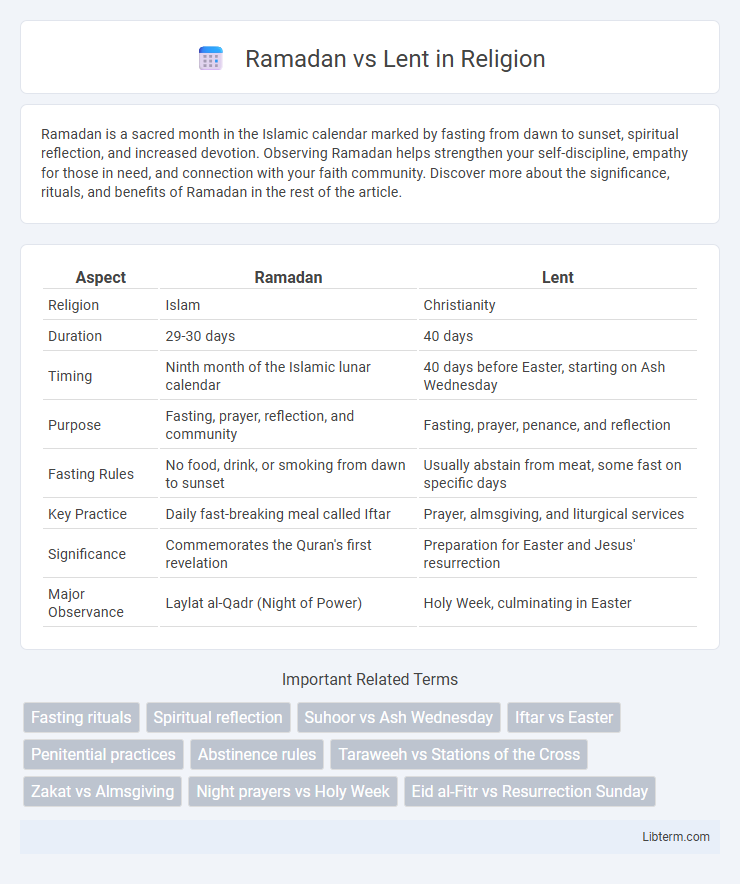Ramadan is a sacred month in the Islamic calendar marked by fasting from dawn to sunset, spiritual reflection, and increased devotion. Observing Ramadan helps strengthen your self-discipline, empathy for those in need, and connection with your faith community. Discover more about the significance, rituals, and benefits of Ramadan in the rest of the article.
Table of Comparison
| Aspect | Ramadan | Lent |
|---|---|---|
| Religion | Islam | Christianity |
| Duration | 29-30 days | 40 days |
| Timing | Ninth month of the Islamic lunar calendar | 40 days before Easter, starting on Ash Wednesday |
| Purpose | Fasting, prayer, reflection, and community | Fasting, prayer, penance, and reflection |
| Fasting Rules | No food, drink, or smoking from dawn to sunset | Usually abstain from meat, some fast on specific days |
| Key Practice | Daily fast-breaking meal called Iftar | Prayer, almsgiving, and liturgical services |
| Significance | Commemorates the Quran's first revelation | Preparation for Easter and Jesus' resurrection |
| Major Observance | Laylat al-Qadr (Night of Power) | Holy Week, culminating in Easter |
Understanding Ramadan and Lent
Ramadan and Lent are significant religious observances in Islam and Christianity, respectively, involving fasting and spiritual reflection. Ramadan, observed for 29 to 30 days based on the lunar calendar, requires Muslims to fast from dawn to sunset, emphasizing prayer, charity, and self-discipline. Lent spans 40 days leading up to Easter, during which Christians practice fasting, penance, and repentance to prepare for the resurrection of Jesus Christ.
Historical Origins and Significance
Ramadan traces its origins to the 7th century, commemorating the first revelation of the Quran to Prophet Muhammad, marking a period of fasting, prayer, and reflection in Islam. Lent, rooted in early Christian traditions dating back to the 4th century, symbolizes the 40 days Jesus spent fasting in the desert, emphasizing penance and spiritual preparation. Both observances serve as significant spiritual disciplines promoting self-control, devotion, and renewal within their respective faiths.
Core Practices and Rituals
Ramadan centers on fasting from dawn to sunset for 29 or 30 days, emphasizing prayer, Quran recitation, and nightly Taraweeh prayers, while Lent involves fasting, prayer, and almsgiving over 40 days, reflecting Jesus' time in the desert. Both observances include spiritual reflection and penance, with Ramadan incorporating communal iftars and Lent focusing on repentance, often marked by the imposition of ashes on Ash Wednesday. Despite differing durations and traditions, both rituals prioritize self-discipline, sacrifice, and deepening faith through specific core practices.
Duration and Timing of Observance
Ramadan lasts for 29 to 30 days based on the lunar Islamic calendar, typically occurring in the ninth month, varying each year by about 10 to 11 days. Lent spans 40 days, excluding Sundays, observed from Ash Wednesday to Holy Saturday leading up to Easter in the Gregorian calendar, generally between February and April. Both periods serve as significant times of fasting and reflection but follow different calendrical systems and religious traditions.
Fasting Rules and Dietary Restrictions
Ramadan fasting, observed by Muslims, requires abstaining from all food, drink, smoking, and marital relations from dawn until sunset each day of the month, with no exceptions except for specific groups like children, the elderly, and the ill. Lent fasting in Christianity, particularly in Catholic tradition, typically involves abstaining from meat on Fridays and fasting on Ash Wednesday and Good Friday by limiting meal size and frequency, with broader dietary restrictions symbolic of penance. Both Ramadan and Lent emphasize self-discipline and spiritual reflection, but Ramadan enforces a complete daily fast with strict timing, while Lent involves partial fasting and selective food abstinence over a 40-day period.
Spiritual Goals and Intentions
Ramadan and Lent both emphasize spiritual purification and self-discipline through fasting, prayer, and reflection. Ramadan, observed by Muslims, aims to increase taqwa (God-consciousness) and empathy for the less fortunate, strengthening submission to Allah's will. Lent, practiced by Christians, centers on repentance, penance, and preparing the soul for Easter by imitating Jesus' sacrifice and fostering spiritual renewal.
Community and Social Activities
Ramadan and Lent both emphasize community and social activities as integral aspects of spiritual observance; Ramadan features communal iftar meals where Muslims break their fast together, fostering unity and charity through shared experiences. Lent encourages Christians to engage in acts of service, almsgiving, and communal worship, strengthening bonds within congregations and promoting social justice initiatives. These periods highlight collective participation and compassion, reinforcing a sense of belonging and mutual support in their respective faith communities.
Prayer and Worship Traditions
Ramadan and Lent both emphasize intensified prayer and worship, with Ramadan featuring daily prayers called Salah performed five times and special Taraweeh prayers at night. Lent involves Christian fasting combined with increased attendance at church services, devotional prayers, and the Stations of the Cross. Both traditions deepen spiritual reflection and communal worship during their respective periods.
Charity and Acts of Kindness
Ramadan emphasizes zakat, a mandatory form of almsgiving requiring Muslims to donate a specific portion of their wealth to those in need, reinforcing community support and charity throughout the month. Lent encourages acts of kindness such as fasting, prayer, and almsgiving, often through voluntary donations to the poor and service to others as a reflection of sacrifice and spiritual growth. Both traditions promote increased generosity, compassion, and social responsibility as key elements of their observances.
Similarities and Key Differences
Ramadan and Lent are both significant religious observances involving fasting, reflection, and spiritual discipline practiced by Muslims and Christians respectively. Ramadan requires fasting from dawn until sunset for 29-30 days, emphasizing prayer, charity, and self-control, while Lent involves fasting or giving up specific luxuries over 40 days, commemorating the 40 days Jesus fasted in the desert. A key difference lies in the fasting rules and timing: Ramadan fasting is daily and strict about food and drink, whereas Lent often includes selective fasting and broader penitential practices.
Ramadan Infographic

 libterm.com
libterm.com